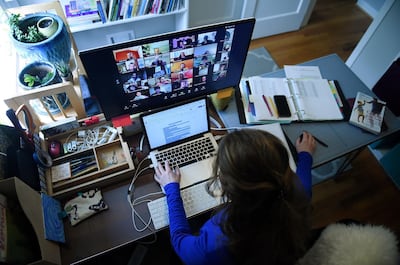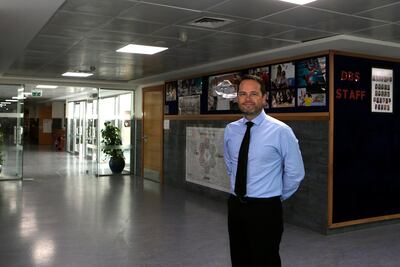School principals are hoping inspectors will be understanding when evaluating their e-learning programmes, while parents say a no-holds-barred approach is needed to maintain the quality of their children’s education.
This month, the standard of distance learning at public and private schools will be assessed by local authorities and the Ministry of Education. E-learning has been offered to pupils since campuses closed in March to prevent the spread of Covid-19.
Here are the six outcomes parents and head teachers told The National they are hoping for once inspections are over.
1. Teacher efforts will be taken into account
Ramesh Mudgal, principal of Dubai’s Global Indian International School, hopes the Dubai School Inspection Bureau will consider the unusual circumstances facing schools.
“DSIB is expected to be mindful of the fact that all schools and teachers are trying their best to cope with the unprecedented expectation of conducting the classes virtually.”
He said many teachers may be doing distance teaching for the first time and are working hard to customise learning to pupils’ different abilities.
2. Leniency for more affordable schools
Sameena Shaheen, principal of the Pakistan Higher Secondary School in Ras Al Khaimah, hopes the challenges faced by low-resourced schools will also be considered.
The community school has 68 teachers and charges parents Dh250 to Dh580 per month.
Little over 600 pupils attend the school and half of these come from low-income families, many of which are sponsored by charity groups. Few of them have devices at home, making it impossible for them to attend online classes.
“Most Pakistani community schools have pupils from low-income families and they don’t have enough devices at home. Families of four children or more share only one device, so not all of them can come online,” she said.
3. Schools will improve further
The inspections will provide valuable feedback now that pupils and teachers have settled with the distance learning programme, said Nav Iqbal, principal of Gems Metropole School in Motor City.
“The Distance Learning Evaluation will … help us move forward with areas of opportunity … which will strengthen our virtual school.”
Brendon Fulton, executive principal at Dubai British Schools, said the evaluations could help reassure parents about the quality of education their children are receiving.
“This should give parents some peace of mind that their children’s needs and interests are being put first, even if they are not physically in our classrooms.”
4. Pupils will be given more schoolwork
Parents have said their children are not given enough work throughout the day, claiming schools are assigning pupils extra homework to compensate.
Simon Bach, from New Zealand, said inspectors should assess how interactive the e-learning programmes are.
He said his two daughters, who attend Kings Dubai, are not given enough time with teachers.
“They basically just get homework dumped on Google Classroom and they finish their whole day of school in less than two hours.
“They aren’t getting enough work … it’s not very interactive either. They [only] get a Zoom call where they have a friendly conservation in the morning.”
He hopes the inspections will reveal that pupils need “double the amount of work” that is currently offered.

5. New, tailored e-learning platforms will be developed
Rashid Hassan, whose daughter attends a French school, said he is not satisfied with the use of Zoom and Google Classrooms, as they are not specially-designed online education modules.
“The schools had to jump and manage a situation they weren’t prepared for. We all agree and understand that, but I don’t call this e-learning,” he said.
“Schools have to invest in real e-learning systems.”
He said it wasn’t enough just to send worksheets to pupils that had to be filled in and emailed back.
“If this going to on for a while, they have to create digital courses.”
6. School fees will be reduced
Farah Shahzad, whose son is in KG2 at Amity School Dubai, is hoping inspectors will ask schools to justify their fees.
She is unhappy with the e-learning programme offered to her son and said she was not given a discount on fees.
“I know teachers are getting used to the digital teaching, but the inspectors need to see why the school is repeating the content the kids have already learnt in KG1,” she said.
“Many schools gave parents fees discounts and we were hoping to get one too. Not only has my husband lost his job, but we are also not happy with the quality of the digital learning.”
She said the teachers are focusing mostly on arts and crafts and main subjects, such as English and Maths, are not getting enough attention.



